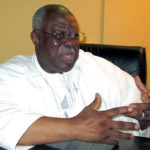At its July, 2017, international conference in Abuja, the Society proudly conferred the prestigious honorary fellowship, the highest cadre of NCS membership, on the Minister of Communications, Alhaji Abdur-Raheem Adebayo Shittu, a lawyer by profession.
Admitting the Minister to the College of Fellows of NCS, Deacon Ojinta Oji-Alala, the provost of the college, extolled the virtues of Shittu and his contribution to ICT development since becoming the Minister. Specifically, the computer professionals recognized, among other qualities, the minister’s style of “running an open government with a listening ear and very accessible.” Other qualifications listed by the NCS include: His huge contribution towards harnessing the potentials of ICT for sustainable development; seeking technological solutions to meet National aspirations for sustainable inclusive future thereby promoting digital liberation and Smart Governance; promoting policies that will support ICT growth and innovations toward a knowledge-based economy where ICT will provide the bedrock to all our activities in critical sectors of the economy and strengthening local content policy for intense capacity building and mainstreaming of ICT in Government service provision to enhance ICT growth in the Country.
Just last week, Shittu bagged the Africa ICT Personality 2017 award. He was adjudged fit for this honour by the Africa Information & Communication Technologies Alliance, AfICTA, which actually screened three nominees.
Chairman, board of Africa ICT Alliance, Jimson Olufuye listed the criteria for Shittu’s choice as his dynamic captainship of Nigeria’s ICT sector, and specifically for sustaining ICT contribution to Nigeria’s GDP at over 10%; sustaining Nigeria’s teledensity at over 100%; and boosting internet penetration in Nigeria and Africa through focus on broadband plan.
“The Africa ICT Personality award is a registered trademark award of AfICTA to recognise top public servants in governments in Africa who have distinguished themselves on Africa’s journey to an Information Society,” wrote Olufuye.
Although he trained as a lawyer, he has made his mark in propagating Islamic education as an author of several books. He is perhaps better known as a political activist committed to open and accountable governance. Indeed, just four years after becoming a lawyer, he was ripe to play national politics, associating with Chief Obafemi Awolowo and Chief Moshood Abiola, both symbols of sagacious politics in Yorubaland.
At age 26, he was elected into the Oyo State House of Assembly as a lawmaker. That was in 1979. Since then, Shittu has lived and played politics; aspiring to surpass himself in service to humanity and in the pursuit of the greatest good for the greatest number.
As the Minister of Communications since November 2015, he has carried himself as “a learned person” who aspires to acquire more knowledge in the constantly changing world of information and communication technology. Astute, open and ready to listen, Shittu, from day one, shunned the toga of the man at the top. He was willing to learn; but more noticeable, he desired and propagated an inclusive approach in formulating and charting a course for the Nigerian Communications sector.
Indeed, his first shot was the convocation of a Stakeholders Forum in Ibadan to draw a four-year roadmap for the sector.
The roadmap, now approved by the Federal Executive Council, seeks to address both public and private infrastructure deficit in Nigeria’s ICT sector for substantial improvement in quality of service. Some key aspects of the plan are improved broad band penetration and internet coverage, boost for ICT education with the upgrading of the Digital Bridge Institute to a University of ICT, enhance satellite communication and coverage, curb cyber crime, ensure that ICT contributes a bigger share of national revenue and acts as a catalyst to the economic diversification drive of the Buhari Administration.
The Minister rightly identified five key focus areas on the Roadmap, namely: Infrastructure development including information security, broadband development & improvement of Quality of Service & Access, Smart Government, Human Capital capacity building, and Local Content development.
Presently, the following policy interventions are in progress towards making the Communications Sector a major driver of the national economy:
Full Implementation of the National Broadband Plan as the foundation for infrastructure development;
Encouraging service providers to use renewable energy for powering Base Transceiver Stations for improvement of Quality of Service and Access;
Engaging with the Federal Ministry of Education to ensure mandatory ICT education at the Primary level and alignment of the ICT education curriculum to meet current global trends;
Accelerating the bridging of the Knowledge Skills Gap in the Nigeria ICT Skills set ecosystem;
Encouraging implementers of e-services to incentivize users to migrate from lower to higher technologies in order to promote ICT utilization and exploitation across sectors;
Promoting initiatives that will advance innovation and creativity;
Creating a sustainable funding framework for the implementation of the e-government Master Plan and other ICT initiatives of government through active engagement with the private sector;
Enforcing implementation of the Local Content Guidelines to ensure patronage of indigenous products and services, as well as increase participation of Nigerians in the ICT economy; including patronage of Nigcomsat by government and local private investors;
Implementing the National Addressing Policy to promote national security and support e-commerce;
Accelerating the passage of the Nigeria Postal Commission Bill to optimize the capacity of NIPOST to be relevant for improved service delivery, and bridge the digital divide towards inclusive development.
Similarly, the Nigerian Postal Service is presently kicking back to life in a massive turn-around anchored on information technology; thanks to Shittu’s ingenuity and passion for revamping passive agencies of government.
The Shaki-born politician has displayed high responsibility towards his national assignment by holding telecoms operators accountable to their operational lapses while formulating policies to entrench international best practices.
On the positive side, he is also pushing for an ICT Development Bank dedicated to funding broadband and data infrastructure development. The proposed bank is expected to serve as a special purpose vehicle to propel the growth of the sector under a PPP arrangement.
The Minister has also shown a great concern for the plight of service providers. The National Economic Council has approved a policy to harmonize right of way charges payable by telecom companies and related public utility infrastructure on Local Governments, States and Federal Highways. This is a policy to minimize the spaces occupied, burden on the roads and reduce taxes payable by telecom operators.
Stakeholders in the Communications sector are agreed that the phenomenal growth of the sector is a testimony to the hard work and indefatigable contributions of Shittu and his team in the last two years, building on the impressive track record of this dynamic industry.
Subscription to telecommunications service in Nigeria has peaked at 145 million. Records from NCC indicate that there were no fewer than 91.6 million internet subscribers on the mobile GSM as at June, this year. Subscribers’ teledensity at the same time was placed at 102.19%. This is a phenomenal growth considering the fact that Nigeria embraced the GSM technology barely 16 years ago.
Indeed, it has been a remarkable feat growing investment in the sector from $50 million to over $68 billion. Within this period it as raked into the Federation Account over N15 trillion, positively influence the way we work and live and added new dynamics to transparency in governance. Indeed, Nigeria currently ranks among the top five fastest growing telecom markets in the world. This record places our country on the same pedestal as China and India and other top economies.
For Shittu and his team at the Communications sector, it can only get better with so much work in progress!
- Kareem is a media consultant based in Abuja.






